人教版(2019)选择性必修第一册Unit 4 Body LanguageLanguage points 2 课件(共29张PPT)
文档属性
| 名称 | 人教版(2019)选择性必修第一册Unit 4 Body LanguageLanguage points 2 课件(共29张PPT) | 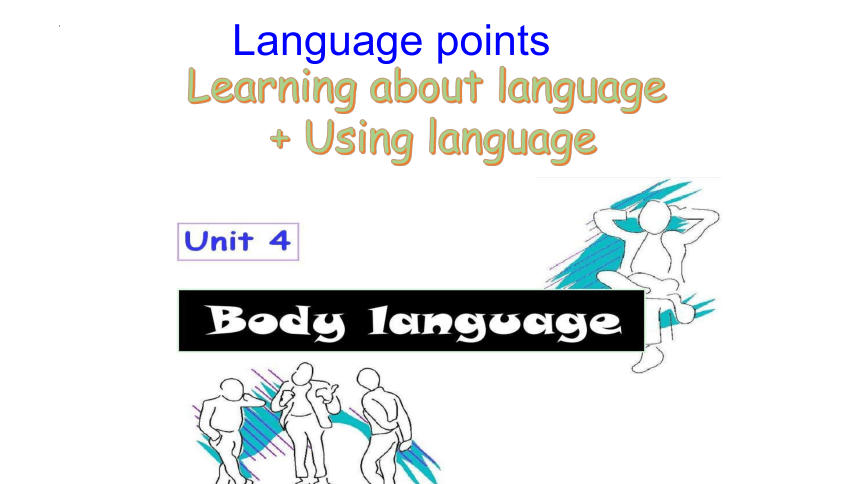 | |
| 格式 | pptx | ||
| 文件大小 | 462.6KB | ||
| 资源类型 | 教案 | ||
| 版本资源 | 人教版(2019) | ||
| 科目 | 英语 | ||
| 更新时间 | 2024-04-14 19:32:41 | ||
图片预览

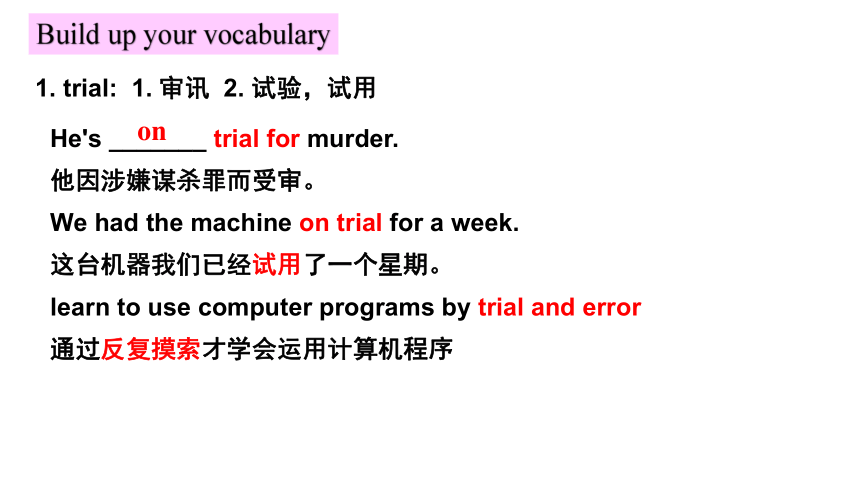
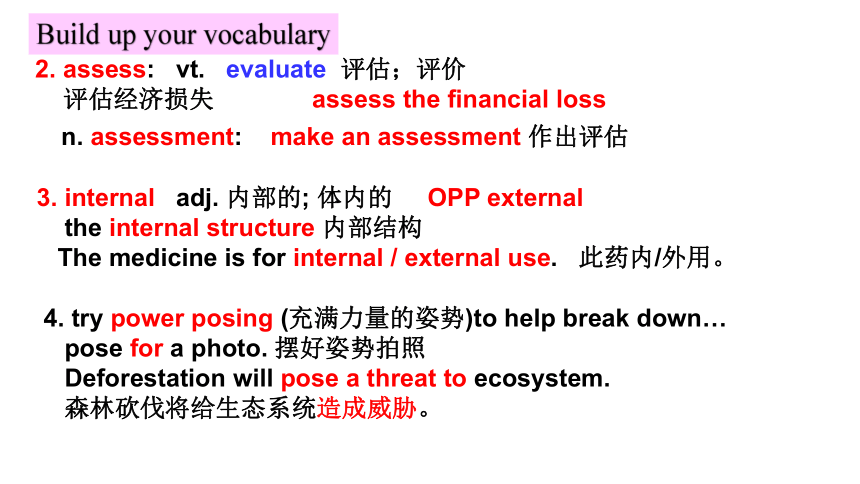
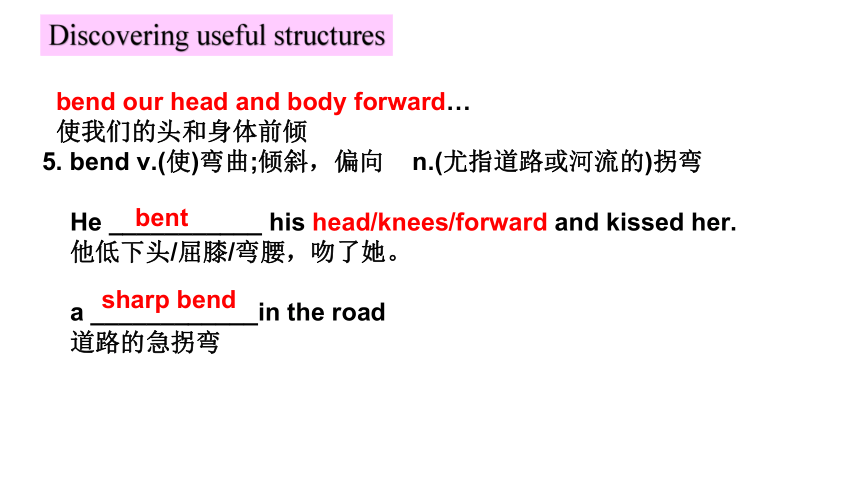
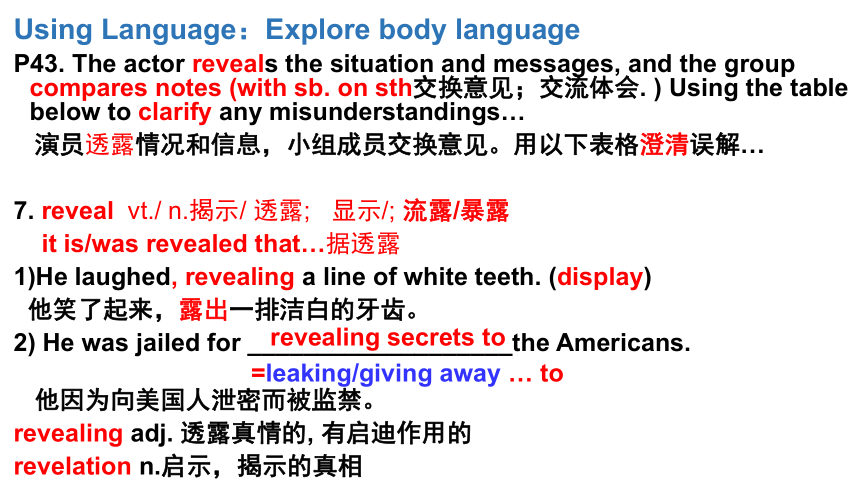
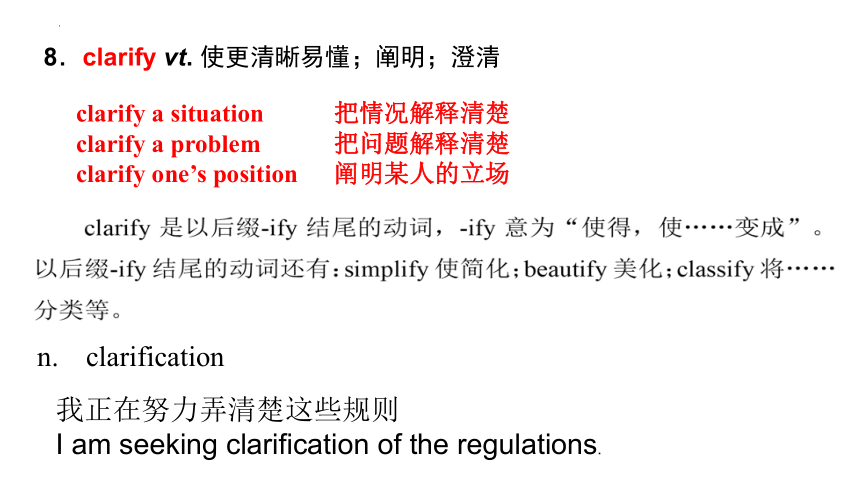
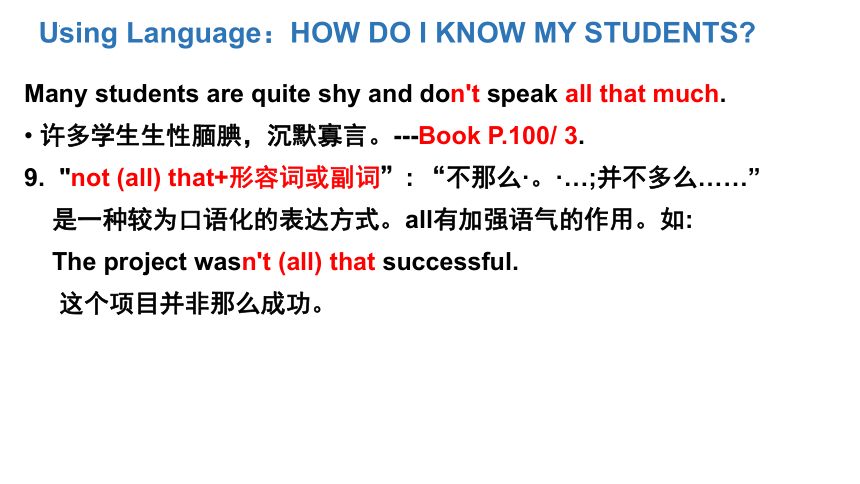
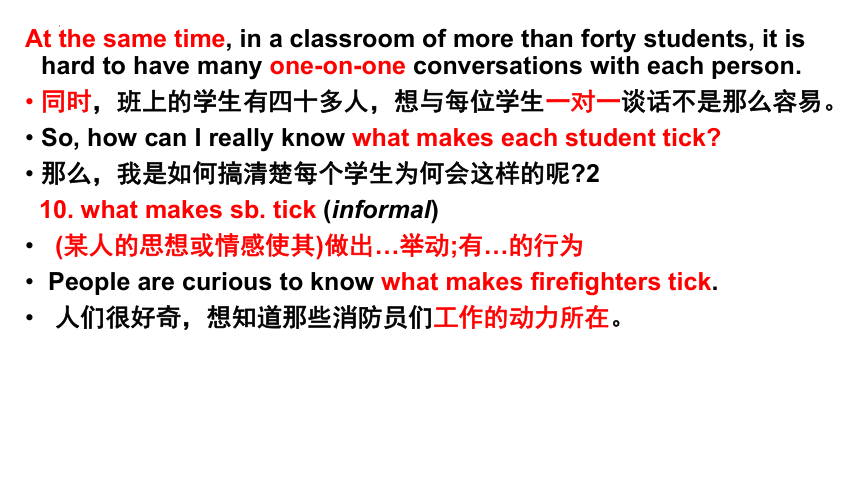
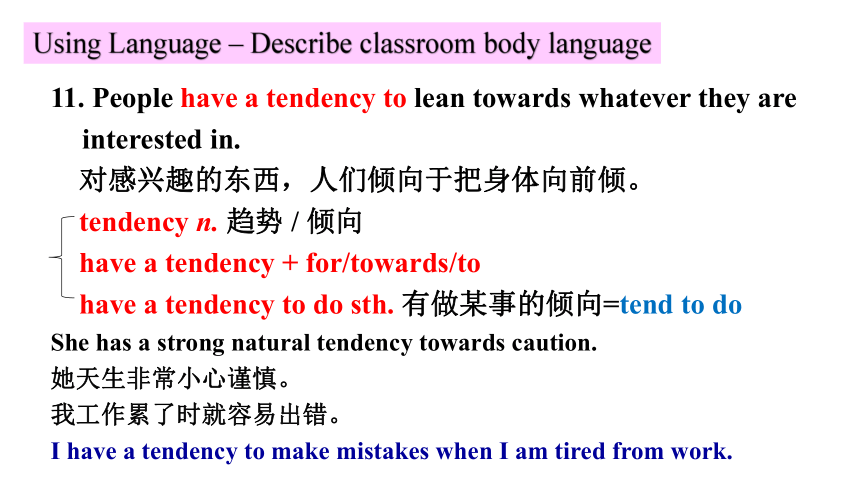
文档简介
(共29张PPT)
Learning about language
+ Using language
Language points
Build up your vocabulary
1. trial: 1. 审讯 2. 试验,试用
He's _______ trial for murder.
他因涉嫌谋杀罪而受审。
We had the machine on trial for a week.
这台机器我们已经试用了一个星期。
learn to use computer programs by trial and error
通过反复摸索才学会运用计算机程序
on
Build up your vocabulary
2. assess: vt. evaluate 评估;评价
评估经济损失 assess the financial loss
n. assessment: make an assessment 作出评估
3. internal adj. 内部的; 体内的 OPP external
the internal structure 内部结构
The medicine is for internal / external use. 此药内/外用。
4. try power posing (充满力量的姿势)to help break down…
pose for a photo. 摆好姿势拍照
Deforestation will pose a threat to ecosystem.
森林砍伐将给生态系统造成威胁。
Discovering useful structures
bend our head and body forward…
使我们的头和身体前倾
5. bend v.(使)弯曲;倾斜,偏向 n.(尤指道路或河流的)拐弯
He ___________ his head/knees/forward and kissed her.
他低下头/屈膝/弯腰,吻了她。
a ____________in the road
道路的急拐弯
bent
sharp bend
P43. The actor reveals the situation and messages, and the group compares notes (with sb. on sth交换意见;交流体会. ) Using the table below to clarify any misunderstandings…
演员透露情况和信息,小组成员交换意见。用以下表格澄清误解…
7. reveal vt./ n.揭示/ 透露; 显示/; 流露/暴露
it is/was revealed that…据透露
He laughed, revealing a line of white teeth. (display)
他笑了起来,露出一排洁白的牙齿。
2) He was jailed for ___________________the Americans.
他因为向美国人泄密而被监禁。
revealing adj. 透露真情的, 有启迪作用的
revelation n.启示,揭示的真相
Using Language:Explore body language
revealing secrets to
=leaking/giving away … to
8.clarify vt. 使更清晰易懂;阐明;澄清
clarify a situation 把情况解释清楚
clarify a problem 把问题解释清楚
clarify one’s position 阐明某人的立场
clarification
n.
我正在努力弄清楚这些规则
I am seeking clarification of the regulations.
Many students are quite shy and don't speak all that much.
许多学生生性腼腆,沉默寡言。---Book P.100/ 3.
9. "not (all) that+形容词或副词”: “不那么·。·…;并不多么……”
是一种较为口语化的表达方式。all有加强语气的作用。如:
The project wasn't (all) that successful.
这个项目并非那么成功。
Using Language:HOW DO I KNOW MY STUDENTS
At the same time, in a classroom of more than forty students, it is hard to have many one-on-one conversations with each person.
同时,班上的学生有四十多人,想与每位学生一对一谈话不是那么容易。
So, how can I really know what makes each student tick
那么,我是如何搞清楚每个学生为何会这样的呢 2
10. what makes sb. tick (informal)
(某人的思想或情感使其)做出…举动;有…的行为
People are curious to know what makes firefighters tick.
人们很好奇,想知道那些消防员们工作的动力所在。
11. People have a tendency to lean towards whatever they are interested in.
对感兴趣的东西,人们倾向于把身体向前倾。
tendency n. 趋势 / 倾向
have a tendency + for/towards/to
have a tendency to do sth. 有做某事的倾向=tend to do
She has a strong natural tendency towards caution.
她天生非常小心谨慎。
我工作累了时就容易出错。
I have a tendency to make mistakes when I am tired from work.
Using Language – Describe classroom body language
So if a student has his head lowered (=bent)to look at his watch, it implies he is bored and just counting the minutes for the class to end.
所以,如果一名学生低头看手表,这就表明他觉得无聊,数着时间,只盼早点下课。
12. lower vt. /vi. 把…放低;降低;减少 adj. 下面的;下方的;较小的
Christina blushed and lowered her eyes/head.
克里丝蒂娜脸红了,并垂下了眼睛/头。
He lowered his voice /His voice lowered .
压低声音
Do you think we should lower the price
你觉得我们应该降价吗?
13. Not everyone who looks up is pay attention in class.
部分否定
不是所有抬起头的学生都在认真听课。
两扇窗子并不都开着。
Not both (the) windows are open.
Both (the) windows are not open.
(全否定)两扇窗子都没开着。
Neither window is open.
Their eyes barely move, and they always have the same distant expression on their faces.
他们的眼睛几乎不动,脸上表情疏远呆滞
14. barely adv.几乎不(hardly); 勉强才能; 刚刚;
1) barely .…when …一……就……
他们刚扎好帐篷就开始下雨了。
They _________________________the tents when it started to rain.
= Barely/Hardly ________________the tents when it started to rain.
2) The hill in the distance was _______________.
勉强能看见远山。
had barely [=hardly] set up
had they set up
barely visible
It is as though they are asleep with their eyes open (adj).
(他们的眼睛几乎不动,脸上表情疏远呆滞,)好像睁着眼睛在睡觉。
with one’s eyes closed (adj) 闭着眼睛
They spend all their time looking anywhere but at me.
整节课他们始终盯着别的东西,没看我一眼。
but : apart from 除…以外;
I had no option/alternative(choice) but ________(fire)him.
to fire
With their chins on their hands, they occupy themselves by staring out of the window or up at the ceiling.
他们托着下巴,全神贯注地盯着窗外或天花板。
15. occupy vt.
使用, 占用(空间、面积、时间等 take up);
侵占; 占领
使忙于(做某事)
任职
occupied adj. 忙于;被占用的 被占领的
Football_________________________________.
足球占用了我大多数的闲暇时间。
Is this seat _________________ 这座位有人吗
He ______________ at the moment. May I take a message
他现在很忙。要我带个口信吗?
她去年在忙于写一本小说。
She __________________________________a novel last year.
occupies most of my leisure /spare time
occupied(=taken)
is occupied
occupied herself (by/in /with )writing=
is occupied (in/with) writing
The main thing is reminding distracted students that they need to pay attention in class.
重要的是提醒走神的学生专心听讲。
16. distract vt. 分散(注意力);使分心
Playing video games sometimes distracts him / his attention from his homework.
玩电子游戏有时会使他无心做作业。
While it is easy to perceive when students are interested, bored, or distracted, it is sometimes much harder to distinguish when students are troubled.
尽管学生们何时(对讲课)感兴趣、何时感到无聊或精力不集中是容易察觉的,但要发现学生何时有困扰有时会难得多。
17. perceive
察觉,注意到,发觉(notice, see)
将…理解为;将…视为 (perceive…as/…to be/to have done)
I perceived something moving in the shadows.
我感觉到有东西在阴影中移动。
____________ he wasn't happy with the arrangements, I tried to book a different hotel.
感觉到他对安排不满意,我就设法预订另一家饭店。
He ___________________one of the best players in baseball.
他是公认的最好的棒球选手之一。
The patient _______________________difficulty in breathing.
发现病人已经呼吸困难。
Perceiving that
is perceived as
was perceived to have
18. distinguish vi.&vt. 区分;辨别---学案p.78/ 3.
1.你够大了,该能区分现实和幻想了。 ---学案
You’re old enough to distinguish (between) fact and fantasy.
=You’re old enough to distinguish fact from fantasy.
2.What was it ___________________________her classmates
是什么使得她有别于班上其他同学呢?
3. Reading good books can not only enrich our minds but also teach us to ____________________________________ (明辨是非).
4.She ___________________her achievements in genetic research.
她以在遗传学领域的研究而久负盛名。
distinguish between right and wrong
that distinguished her from
is distinguished for
Students who are angry, afraid, or experiencing anxiety may have their arms crossed in front of their chests and their legs closed or crossed, like (as if )they are guarding their bodies.愤怒、害怕或焦虑的学生会双臂交叉放在胸前,双腿并拢或交叉,像是在保护自己的身体。
19.anxiety n.[u] 焦虑;担心;害怕; [c]令人担心(或焦虑)的事
anxious adj. anxiously adv.
anxiety + about/over/ at 焦虑;忧虑
wait with anxiety
焦急地等待
Children normally ________________________ their first day at school.
第一天上学,孩子通常都会感到非常不安。
feel a lot of anxiety about
Students who are sad or worried will nearly always wear a frown.
伤心或忧虑的学生几乎总是皱着眉头。
20. wear: to have a particular expression on your face
面露,面带(某种表情); 呈现(某种神态)
He __________________on his face.
他脸上流露出迷惑不解的神情。
wore a puzzled look
They may also hide their faces in their hands like they are embarrassed or ashamed.
他们也会双手捂脸,一副尴尬或羞愧的样子。
21. ashamed adj. 感到羞愧、惭愧的
shameful adj. 可耻的、丢脸的
shame n. 羞耻、羞愧、令人惋惜的事
shame on sb. 某人真丢脸
It is a shame that… …令人惋惜、遗憾
You should ______________ your _________ behavior.
你应该对你可耻的行为感到羞愧。
be ashamed of
shameful
However, if a student does not bother to brush her hair and her eyes are red from weeping, then I can infer that there are deeper issues at work. 但是,要是学生都懒得梳头,并且两眼因哭泣而发红,那么我能够推断她遇到了更严重的问题。
22. bother vi.&vt.费心;麻烦;因…操心
n.[u]麻烦,不便,困难(trouble)
懒得/不费心做某事
not bother to do sth / doing sth
not bother about / with sth.
Sorry to bother you , but… 对不起打扰你一下
It bothers sb. that/how/when… 使恼怒/烦扰
I had a little bother finding your house.
找到你家我可费了点事。
1. He won’ t come, so why___________________________ (费心邀请他)
2. He didn’t even _____________________________(费心让我知道) he was coming.
3. I don’t want to _____________________(因为……而麻烦她) my children at the moment.
4. 她比你挣的钱多,你是不是觉得不自在?
____________________________ she earns more than you
bother to let me know
= bother letting me know
bother her with
Does it bother you that
bother inviting/ to invite him
23. Some students act this way merely because they are afraid of being called on by the teacher.
call on(短暂地)拜访;要求(某人讲话等);正式邀请;号召
(1)The President __________________________________to make the country rich and strong.
总统号召人民努力工作,使国家富强起来。
(2)I felt quite nervous when the teacher ____________________________________.
老师叫我回答问题时,我感到相当紧张。
(3) I called at his house, but he wasn’t in. So I left a message telling him that I would ____________ (拜访他)the next day.
called on the people to work hard
called on me to answer the question
call on him
Ultimately(=in the end; finally; ), my duty is helping every student to learn.
最后,我的职责是帮助每一位学生学习。
Their body language lets me know when to adjust class activities, when to intervene, and when to talk to students individually, so they can get the most out of school.
他们的肢体语言让我知道该何时调整课堂活动、何时干预、何时与学生单独谈话,从而让他们在校收获最大。
I _____________________________________ life.
我尽我所能从生活中得到最大的收获。
do what I can to get the most out of
24 adjust vt. 调整;调节 vi.&vt.适应;(使)习惯
adjustment n. [c/u ] adjustable adj.可调整的, 可调节的
调整;调节
adjust sth to sth
make adjustments / an adjustment ( to sth.)
适应;(使)习惯
=adapt to
adjust to sth
adjust yourself to sth
The kids will eventually ___________________________________.
孩子们最终会适应新学校的。
Teachers have to adjust their teaching methods to the needs of different children.教师必须根据不同孩子的需要调整教学方法。
adjust (themselves) to the new school
The room was full of dancers, all _______________________________________their costumes.
房间里满是舞蹈演员,都在对演出服装作最后的调整。
The height of these seats is ______________(adjust).
_____________ (adjust) to a new environment is more difficult than we expected.
making last-minute adjustments to
adjustable
Adjusting
Learning about language
+ Using language
Language points
Build up your vocabulary
1. trial: 1. 审讯 2. 试验,试用
He's _______ trial for murder.
他因涉嫌谋杀罪而受审。
We had the machine on trial for a week.
这台机器我们已经试用了一个星期。
learn to use computer programs by trial and error
通过反复摸索才学会运用计算机程序
on
Build up your vocabulary
2. assess: vt. evaluate 评估;评价
评估经济损失 assess the financial loss
n. assessment: make an assessment 作出评估
3. internal adj. 内部的; 体内的 OPP external
the internal structure 内部结构
The medicine is for internal / external use. 此药内/外用。
4. try power posing (充满力量的姿势)to help break down…
pose for a photo. 摆好姿势拍照
Deforestation will pose a threat to ecosystem.
森林砍伐将给生态系统造成威胁。
Discovering useful structures
bend our head and body forward…
使我们的头和身体前倾
5. bend v.(使)弯曲;倾斜,偏向 n.(尤指道路或河流的)拐弯
He ___________ his head/knees/forward and kissed her.
他低下头/屈膝/弯腰,吻了她。
a ____________in the road
道路的急拐弯
bent
sharp bend
P43. The actor reveals the situation and messages, and the group compares notes (with sb. on sth交换意见;交流体会. ) Using the table below to clarify any misunderstandings…
演员透露情况和信息,小组成员交换意见。用以下表格澄清误解…
7. reveal vt./ n.揭示/ 透露; 显示/; 流露/暴露
it is/was revealed that…据透露
He laughed, revealing a line of white teeth. (display)
他笑了起来,露出一排洁白的牙齿。
2) He was jailed for ___________________the Americans.
他因为向美国人泄密而被监禁。
revealing adj. 透露真情的, 有启迪作用的
revelation n.启示,揭示的真相
Using Language:Explore body language
revealing secrets to
=leaking/giving away … to
8.clarify vt. 使更清晰易懂;阐明;澄清
clarify a situation 把情况解释清楚
clarify a problem 把问题解释清楚
clarify one’s position 阐明某人的立场
clarification
n.
我正在努力弄清楚这些规则
I am seeking clarification of the regulations.
Many students are quite shy and don't speak all that much.
许多学生生性腼腆,沉默寡言。---Book P.100/ 3.
9. "not (all) that+形容词或副词”: “不那么·。·…;并不多么……”
是一种较为口语化的表达方式。all有加强语气的作用。如:
The project wasn't (all) that successful.
这个项目并非那么成功。
Using Language:HOW DO I KNOW MY STUDENTS
At the same time, in a classroom of more than forty students, it is hard to have many one-on-one conversations with each person.
同时,班上的学生有四十多人,想与每位学生一对一谈话不是那么容易。
So, how can I really know what makes each student tick
那么,我是如何搞清楚每个学生为何会这样的呢 2
10. what makes sb. tick (informal)
(某人的思想或情感使其)做出…举动;有…的行为
People are curious to know what makes firefighters tick.
人们很好奇,想知道那些消防员们工作的动力所在。
11. People have a tendency to lean towards whatever they are interested in.
对感兴趣的东西,人们倾向于把身体向前倾。
tendency n. 趋势 / 倾向
have a tendency + for/towards/to
have a tendency to do sth. 有做某事的倾向=tend to do
She has a strong natural tendency towards caution.
她天生非常小心谨慎。
我工作累了时就容易出错。
I have a tendency to make mistakes when I am tired from work.
Using Language – Describe classroom body language
So if a student has his head lowered (=bent)to look at his watch, it implies he is bored and just counting the minutes for the class to end.
所以,如果一名学生低头看手表,这就表明他觉得无聊,数着时间,只盼早点下课。
12. lower vt. /vi. 把…放低;降低;减少 adj. 下面的;下方的;较小的
Christina blushed and lowered her eyes/head.
克里丝蒂娜脸红了,并垂下了眼睛/头。
He lowered his voice /His voice lowered .
压低声音
Do you think we should lower the price
你觉得我们应该降价吗?
13. Not everyone who looks up is pay attention in class.
部分否定
不是所有抬起头的学生都在认真听课。
两扇窗子并不都开着。
Not both (the) windows are open.
Both (the) windows are not open.
(全否定)两扇窗子都没开着。
Neither window is open.
Their eyes barely move, and they always have the same distant expression on their faces.
他们的眼睛几乎不动,脸上表情疏远呆滞
14. barely adv.几乎不(hardly); 勉强才能; 刚刚;
1) barely .…when …一……就……
他们刚扎好帐篷就开始下雨了。
They _________________________the tents when it started to rain.
= Barely/Hardly ________________the tents when it started to rain.
2) The hill in the distance was _______________.
勉强能看见远山。
had barely [=hardly] set up
had they set up
barely visible
It is as though they are asleep with their eyes open (adj).
(他们的眼睛几乎不动,脸上表情疏远呆滞,)好像睁着眼睛在睡觉。
with one’s eyes closed (adj) 闭着眼睛
They spend all their time looking anywhere but at me.
整节课他们始终盯着别的东西,没看我一眼。
but : apart from 除…以外;
I had no option/alternative(choice) but ________(fire)him.
to fire
With their chins on their hands, they occupy themselves by staring out of the window or up at the ceiling.
他们托着下巴,全神贯注地盯着窗外或天花板。
15. occupy vt.
使用, 占用(空间、面积、时间等 take up);
侵占; 占领
使忙于(做某事)
任职
occupied adj. 忙于;被占用的 被占领的
Football_________________________________.
足球占用了我大多数的闲暇时间。
Is this seat _________________ 这座位有人吗
He ______________ at the moment. May I take a message
他现在很忙。要我带个口信吗?
她去年在忙于写一本小说。
She __________________________________a novel last year.
occupies most of my leisure /spare time
occupied(=taken)
is occupied
occupied herself (by/in /with )writing=
is occupied (in/with) writing
The main thing is reminding distracted students that they need to pay attention in class.
重要的是提醒走神的学生专心听讲。
16. distract vt. 分散(注意力);使分心
Playing video games sometimes distracts him / his attention from his homework.
玩电子游戏有时会使他无心做作业。
While it is easy to perceive when students are interested, bored, or distracted, it is sometimes much harder to distinguish when students are troubled.
尽管学生们何时(对讲课)感兴趣、何时感到无聊或精力不集中是容易察觉的,但要发现学生何时有困扰有时会难得多。
17. perceive
察觉,注意到,发觉(notice, see)
将…理解为;将…视为 (perceive…as/…to be/to have done)
I perceived something moving in the shadows.
我感觉到有东西在阴影中移动。
____________ he wasn't happy with the arrangements, I tried to book a different hotel.
感觉到他对安排不满意,我就设法预订另一家饭店。
He ___________________one of the best players in baseball.
他是公认的最好的棒球选手之一。
The patient _______________________difficulty in breathing.
发现病人已经呼吸困难。
Perceiving that
is perceived as
was perceived to have
18. distinguish vi.&vt. 区分;辨别---学案p.78/ 3.
1.你够大了,该能区分现实和幻想了。 ---学案
You’re old enough to distinguish (between) fact and fantasy.
=You’re old enough to distinguish fact from fantasy.
2.What was it ___________________________her classmates
是什么使得她有别于班上其他同学呢?
3. Reading good books can not only enrich our minds but also teach us to ____________________________________ (明辨是非).
4.She ___________________her achievements in genetic research.
她以在遗传学领域的研究而久负盛名。
distinguish between right and wrong
that distinguished her from
is distinguished for
Students who are angry, afraid, or experiencing anxiety may have their arms crossed in front of their chests and their legs closed or crossed, like (as if )they are guarding their bodies.愤怒、害怕或焦虑的学生会双臂交叉放在胸前,双腿并拢或交叉,像是在保护自己的身体。
19.anxiety n.[u] 焦虑;担心;害怕; [c]令人担心(或焦虑)的事
anxious adj. anxiously adv.
anxiety + about/over/ at 焦虑;忧虑
wait with anxiety
焦急地等待
Children normally ________________________ their first day at school.
第一天上学,孩子通常都会感到非常不安。
feel a lot of anxiety about
Students who are sad or worried will nearly always wear a frown.
伤心或忧虑的学生几乎总是皱着眉头。
20. wear: to have a particular expression on your face
面露,面带(某种表情); 呈现(某种神态)
He __________________on his face.
他脸上流露出迷惑不解的神情。
wore a puzzled look
They may also hide their faces in their hands like they are embarrassed or ashamed.
他们也会双手捂脸,一副尴尬或羞愧的样子。
21. ashamed adj. 感到羞愧、惭愧的
shameful adj. 可耻的、丢脸的
shame n. 羞耻、羞愧、令人惋惜的事
shame on sb. 某人真丢脸
It is a shame that… …令人惋惜、遗憾
You should ______________ your _________ behavior.
你应该对你可耻的行为感到羞愧。
be ashamed of
shameful
However, if a student does not bother to brush her hair and her eyes are red from weeping, then I can infer that there are deeper issues at work. 但是,要是学生都懒得梳头,并且两眼因哭泣而发红,那么我能够推断她遇到了更严重的问题。
22. bother vi.&vt.费心;麻烦;因…操心
n.[u]麻烦,不便,困难(trouble)
懒得/不费心做某事
not bother to do sth / doing sth
not bother about / with sth.
Sorry to bother you , but… 对不起打扰你一下
It bothers sb. that/how/when… 使恼怒/烦扰
I had a little bother finding your house.
找到你家我可费了点事。
1. He won’ t come, so why___________________________ (费心邀请他)
2. He didn’t even _____________________________(费心让我知道) he was coming.
3. I don’t want to _____________________(因为……而麻烦她) my children at the moment.
4. 她比你挣的钱多,你是不是觉得不自在?
____________________________ she earns more than you
bother to let me know
= bother letting me know
bother her with
Does it bother you that
bother inviting/ to invite him
23. Some students act this way merely because they are afraid of being called on by the teacher.
call on(短暂地)拜访;要求(某人讲话等);正式邀请;号召
(1)The President __________________________________to make the country rich and strong.
总统号召人民努力工作,使国家富强起来。
(2)I felt quite nervous when the teacher ____________________________________.
老师叫我回答问题时,我感到相当紧张。
(3) I called at his house, but he wasn’t in. So I left a message telling him that I would ____________ (拜访他)the next day.
called on the people to work hard
called on me to answer the question
call on him
Ultimately(=in the end; finally; ), my duty is helping every student to learn.
最后,我的职责是帮助每一位学生学习。
Their body language lets me know when to adjust class activities, when to intervene, and when to talk to students individually, so they can get the most out of school.
他们的肢体语言让我知道该何时调整课堂活动、何时干预、何时与学生单独谈话,从而让他们在校收获最大。
I _____________________________________ life.
我尽我所能从生活中得到最大的收获。
do what I can to get the most out of
24 adjust vt. 调整;调节 vi.&vt.适应;(使)习惯
adjustment n. [c/u ] adjustable adj.可调整的, 可调节的
调整;调节
adjust sth to sth
make adjustments / an adjustment ( to sth.)
适应;(使)习惯
=adapt to
adjust to sth
adjust yourself to sth
The kids will eventually ___________________________________.
孩子们最终会适应新学校的。
Teachers have to adjust their teaching methods to the needs of different children.教师必须根据不同孩子的需要调整教学方法。
adjust (themselves) to the new school
The room was full of dancers, all _______________________________________their costumes.
房间里满是舞蹈演员,都在对演出服装作最后的调整。
The height of these seats is ______________(adjust).
_____________ (adjust) to a new environment is more difficult than we expected.
making last-minute adjustments to
adjustable
Adjusting
